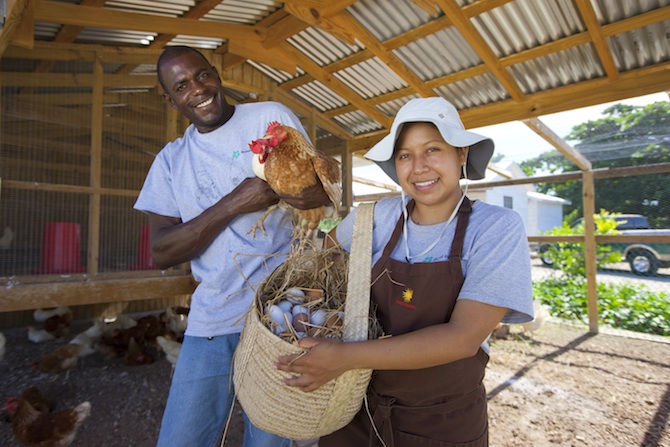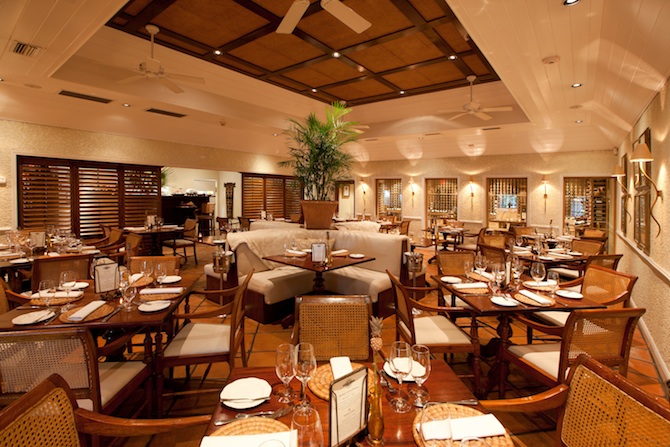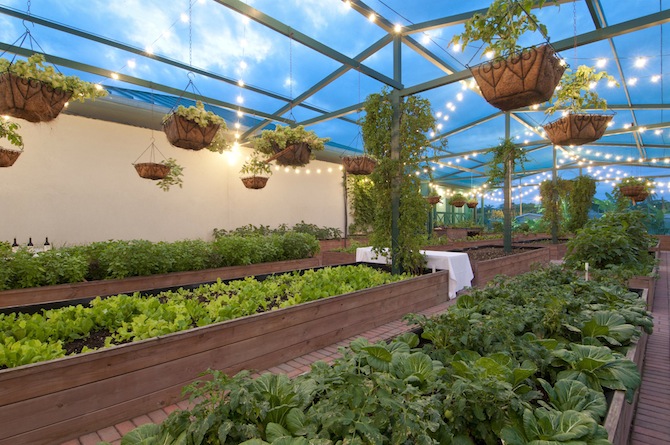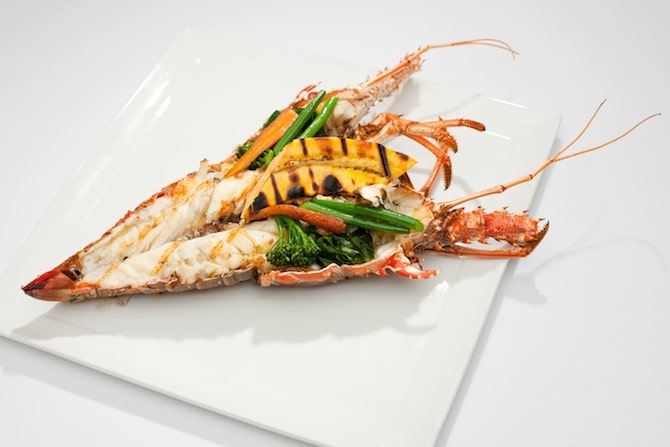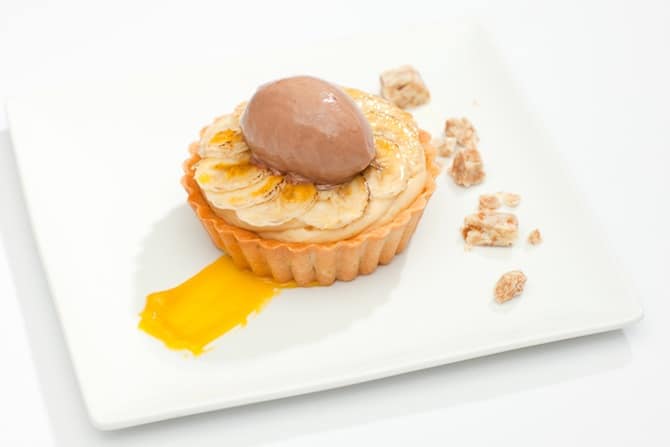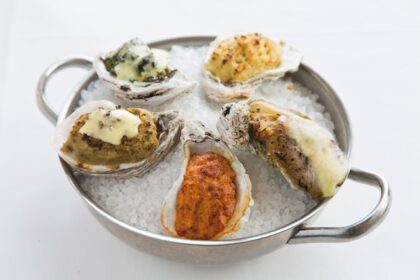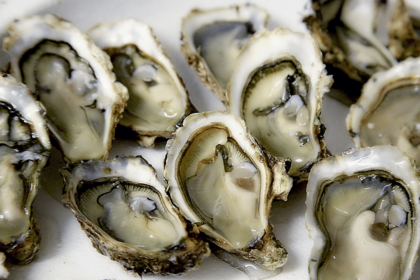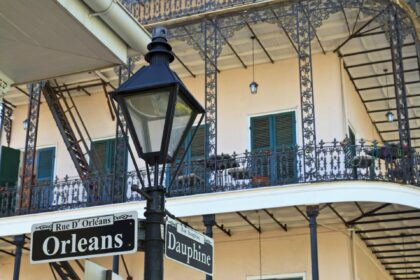While the Caribbean‘s Cayman Islands are home to many great things — seafood, diving, bird-watching, ecotourism — its soil has never been one of them. This has always presented a challenge for Grand Cayman restaurants wanting to participate in the farm-to-table movement and grow their own produce for cooking. That being said, where there’s a will there’s a way, and one eatery has done everything in its power to make local, made-from-scratch, seasonal dishes (and even cocktails!) a reality on Grand Cayman.
The Story
The kitchen garden movement was spearheaded by The Brasserie Restaurant & Market about four years ago, when the idea was born that if they didn’t have the right soil to grow their own fruits and vegetables, they needed to make it. Despite their location in downtown Georgetown, a bit off the beaten path for most travelers, they’re worth the detour.
“We have raised beds and we build our own soil,” explains Corey Blohm, The Brasserie’s General Manager. “We start our seedlings in our propagation house and once we see they are doing well, they get transferred to the raised beds in the main garden. Our peak growing season runs from November through May. During that time we grow a lot of different items in our greenhouse.”
A collaboration between the restaurant’s Chef Dean James Max and local gardener and farmer Joel Walton, what started as an idea four years ago has since inspired a lifestyle movement on the island, with more people wanting to be more conscious of what they eat.
“I think Brasserie has for sure driven the expectation of quality ingredients on the island,” says Chef Dean. “So many islands in the Caribbean use product shipped in from
the USA or other areas and don’t feature many products produced on those islands. Now I feel that we can provide a true Cayman food experience by serving guests seafood caught in these waters and vegetables grown in our soil.”
The Brasserie is not just growing a vegetable or two, but enough to create a well-rounded menu for every taste. In fact, they grow kale, pak choy, callaloo, beets, cauliflower, carrots, heirloom beans, eggplant, tomatoes, heirloom, dragon fruit, bananas, sugar cane and various types of leafy greens. They also cultivate herbs and spices like basil, oregano, garlic chives, onions, mint, rosemary, thyme tarragon and peppers. Outside the greenhouse, carambola, avocado, guava, mango, breadfruit, ackee, curry leaf and pimento are just some of the delicious trees being planted. Straight from the garden, these healthy, fresh items are added into The Brasserie’s food and drink.
And it isn’t just the produce that’s fresh. The Brasserie has two private fishing boats — “Brasserie Catch I” and “Brasserie Catch II” — their full-time captains take out daily to catch fresh Cayman Islands’ fare. Additionally, “Chateau Chooks,” the restaurant’s very own chicken coop, allows them to keep 75 hens that lay eggs for the restaurant and for staff to take to market.
The Menu
The Brasserie serves breakfast, lunch and dinner, and each menu is packed with delicious items. Chef Dean James Max is passionate about fresh, local, simple cooking, made apparent by his menu. Along with shared plates like fresh-catch fish cakes seasoned with pepper aioli, locally-inspired charcuterie boards and ceviche made with local fish, Cayman coconut and lime, and garden cilantro, they offer a short yet satiating main menu. Some highlights include a locally-farmed organic 1/2 chicken with organic corn grits, goat cheese, local carrots, braised raisins, toasted pecans, spicy greens and natural chicken jus; a seafood pasta featuring ‘Chateau Chooks’ egg yolk pasta, cherry tomato, Cedar Key littleneck clams, ‘Brasserie catch’ fish, tiger shrimp, pei mussels and garden basil broth; and a flavorful veggie plate with organic grains and seasonal produce from the garden.
Don’t skip dessert, as decadent options like a chocolate caramel ganache tart with honey caramel peanut sauce and passionfruit ice cream; sticky toffee date pudding with toasted coconut ice cream and roasted pineapple; and sorbets made with local tangerine and aloe vera and pineapple from the garden are worth the calories.
For both dinner and dessert Chef’s tasting menus are available.
Cocktails
For those who like to imbibe, The Brasserie allows you to do so in a sustainable manner through farm-to-bar cocktails. Their in-house mixologist, Lexi, begins each day gathering ingredients from the garden and making her own purees, reductions, infusions and sodas from scratch. While you really can’t go wrong with anything on the menu, a few must-try drinks include the “South Sound Coconut Water Mojito” featuring garden mint, a rum soaked sugar cane stir stick and fresh coconut jelly topping; the “Carambola Pisco Sour” gowned in Chateau Chooks egg white foam; and the “Brasserie Garden’ Bloody Mary” with Absolut Peppar, local tomato, garden nasturtium and house-made hot sauce. We also recommend sampling a shot of homemade limoncello for a palate-trip to Italy, as well as their “Garden Black Mint & Cayman Honey Soda.”
“Having the freshest fruits, vegetables and herbs of each season right at your fingertips is very inspiring,” says Lexi. “I incorporate something from our organic garden into every craft cocktail I create. Our menu consists of original cocktails as well as classic cocktails with a “Brasserie” twist. Our owners and management are very supportive and allow me freedom to come up with my creative concoction — from garden to bar!”
Changing Local Culinary Culture
Along with serving food and drink, education on clean local eating is a large component of what The Brasserie does. Along with hosting schools in their garden for tours and talks, they hold monthly Harvest Dinners during Harvest Season to truly immerse guests in farm-to-fork culture. Monthly cooking classes in their exhibition kitchen also teach guests how to use local ingredients to create delicious dishes.
“They always leave with a folder including all the recipes that the Chefs have prepared,” explains Blohm. “We have Caymanian culinary students as interns in our kitchen, as we feel it is so important to teach them about what we do and it is nice to see Caymanians finally studying the culinary arts.”
To further get involved in the community, The Brasserie supports local charities by participating in local charity events and making donations for gift certificates to the restaurant.
While it’s safe to say The Brasserie is the pioneer of the farm-to-table movement on the island and doing it to the fullest extent, there are other restaurants on Grand Cayman also doing what they can to provide local, fresh meals to their guests.
“In the food movement on Cayman over the past seven years I have been involved with the Brasserie, I have surely seen a growth of restaurants taking part in using more fresh products from local island farmers,” says Chef Dean. “There has also been a burst of farm production on the island that shows that demand has grown. We still have a long way to go and the restaurants need to continue to support these growers so we see better product at our local markets and restaurants. Each year people do more on island, as we see more product variety.”
The Future
With so much innovation already happening, we’re wondering what’s in store for the future. According to Blohm, The Brasserie will continue to raise the bar and come up with new options for their sustainable concept.
“We are a team of dreamers and there are talks of farming our own pigs, cattle and goats, roasting our own coffee,” he says. “We are already experimenting with our own apiary. It is a work in progress, but Brasserie Honey is in the future. We have recently started Brasserie Purveyors which imports and supplies the Brasserie and other outlets with small batch craft beers and artisanal wines and spirits. Our Wicket Bar, in the center of Cricket Square on the green, will host many events that showcase our craft spirits and make them available to our customers to purchase.”
Learn More
Interested in learning more about The Brasserie and their mission to make sustainable eating a major part of the Cayman Islands? Follow their hashtag #knowwhereyourfoodcomesfrom on Twitter and Instagram. The ongoing campaign is an effort to move people to be more conscious with their food choices and seek out ingredients — and dishes made with ingredients — that are fresh and local.
Have you ever eaten at The Brasserie or had another environmentally-conscious experience in the Cayman Islands? Please share in the comments below.
Jessica Festa
Latest posts by Jessica Festa (see all)
- A Culturally-Immersive Adventure In Mongolia’s Altai Mountains - Jul 8, 2023
- This Recipe Sharing Platform Supports Women In The Culinary Industry (Labneh Recipe Included!) - Nov 5, 2020
- Hiking The Mohare Danda Community Eco-Trek In Nepal - Jun 3, 2020
- 6 Important Questions For Choosing A Responsible Yoga Retreat - May 18, 2020
- How To Create & Grow A Profitable Blogging Business (Ethically) - Jan 18, 2020

